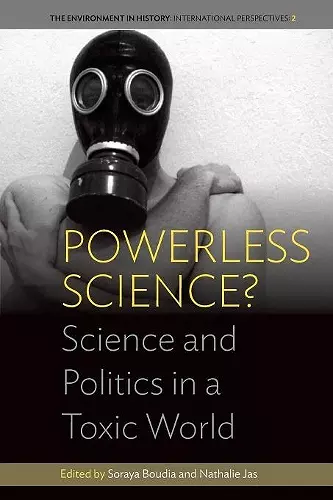Powerless Science?
Science and Politics in a Toxic World
Soraya Boudia editor Nathalie Jas editor
Format:Paperback
Publisher:Berghahn Books
Published:1st Jan '16
Should be back in stock very soon

In spite of decades of research on toxicants, along with the growing role of scientific expertise in public policy and the unprecedented rise in the number of national and international institutions dealing with environmental health issues, problems surrounding contaminants and their effects on health have never appeared so important, sometimes to the point of appearing insurmountable. This calls for a reconsideration of the roles of scientific knowledge and expertise in the definition and management of toxic issues, which this book seeks to do. It looks at complex historical, social, and political dynamics, made up of public controversies, environmental and health crises, economic interests, and political responses, and demonstrates how and to what extent scientific knowledge about toxicants has been caught between scientific, economic, and political imperatives.
“Each chapter is written by an authority on the topic and contains primary bibliographic sources. Overall, the scientific content is accurate and free of obvious partiality.”· Choice
“The editors did a heroic job of assembling and connecting a group of articles from contributors active in interdisciplinary research and studies. They span multiple disciplines (sociology, history, philosophy, economics, and political science), assorted methodologies, different time frames, venues, and geographies… In summary, the absence of knowledge has powerfully shaped the history and social organization of our toxic world. And for this reason, Powerless Science? merits reading and reflective rereading.”· International Social Science Review
“The book will be of interest to the new wave of anthropological studies on toxic contamination and will open the door for researchers and practitioners to actively reimagine what a regulatory apparatus that is de-centered from science might look like.”· Medical Anthropology Quarterly
“The editors of Powerless Science? were successful in overcoming the problem of disparate narratives, ever present in edited collections, especially those dealing with interdisciplinary themes. Although the book embraces different approaches… the diverse perspectives offer different faces of a common research object… [and] provides an extremely rich introduction… The book has also benefited from… the proven professional skills of the authors, all of whom are renowned scholars with successful careers in their respective perspectives on regulatory science.”· AMBIX
“This volume makes a useful companion for understanding the institutional histories and practices that assist in limiting or allowing, ignoring or acknowledging, toxic exposures.”· Medicine Anthropology Theory
“…the empirical payload of the collection…is substantial. The book will be of interest to the new wave of anthropological studies on toxic contamination and will open the door for researchers and practitioners to actively reimagine what a regulatory apparatus that is de-centered from science might look like.”· Medical Anthropology Journal
“This is an innovative, very well organized and overall well written book on one of the most pressing issues of today’s society: the way chemicals contaminate the environment, and how we deal with it… most of the chapters cleverly combine the case study approach with universal features. It is surprising how well this works, both in the chapters and in the book at large.”· Carsten Reinhardt, CEO and President of the Chemical Heritage Foundation, Philadelphia
ISBN: 9781785331985
Dimensions: unknown
Weight: 395g
290 pages